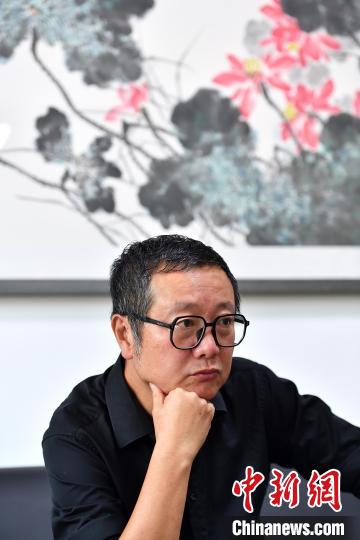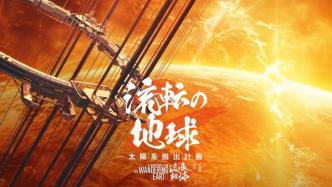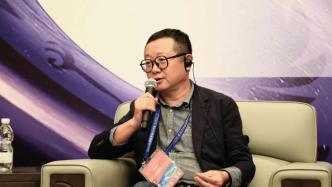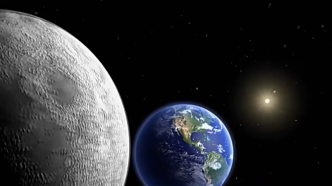
On the 15th, Yangquan, Shanxi held the first Science Fiction Culture Week in Liu Cixin's hometown. During the period, the reporter conducted an exclusive interview with Liu Cixin in the "Liu Cixin Creation and Research Studio", and expressed his views on the current development of science fiction literature, science fiction literature and film industry, and the impact of artificial intelligence on the future of mankind.
The following is the transcript of the interview:
Chinanews.com: I heard that you recently "overturned" a 300,000-word manuscript. What was that work about? Why not continue writing?
Liu Cixin: Because I am dissatisfied. This is normal and happens to every writer. I wrote something related to future energy, which is to cover the moon with solar cells, and then send the electricity from the moon back to the earth through microwaves, which will completely solve the energy problem. The reason why I wrote this is because I was born in the energy industry and I am familiar with people in the energy industry, but later found that this idea is not new at all.
The times are changing rapidly now. When I wrote it, I thought it was a shocking sci-fi idea, but after a short period of time, it may become unremarkable. In this case, even if written out, it is also a thing that is not very readable.
Chinanews.com: Shanxi's literary works are always inseparable from the mountains and loess. What kind of inspiration does this environment in Shanxi bring to you?
Liu Cixin: The literature in Shanxi is thick and based on realism. This land has a thick Sanjin culture, and it is indeed far away from science fiction. But the person who writes science fiction does not necessarily have a direct relationship with the surrounding environment.
Let me give you an example. Arthur Clarke, one of the three recognized masters of science fiction in the world, although he is an Englishman, most of his works were created in a small fishing village in Sri Lanka. Especially in our modern society with advanced information, a person can have complete access to all kinds of information in modern society and the changes brought about by the development of technology in life under any environment. Therefore, no matter whether it is in Shanxi or in a metropolis, the environment faced by science fiction literature is similar.
Chinanews.com: How do you evaluate new technologies such as ChatGPT, brain-computer interface, and memory backup?
Liu Cixin: ChatGPT should be a breakthrough in artificial intelligence technology in the near future. Its impact on us may be far-reaching, at least it may replace the work of many people. Technology is an indispensable thing for the future of mankind. It is impossible for science and technology to stop developing. The development and breakthrough of science and technology are the hope of mankind. When we face some kind of doom, it may well be that the power of technology is our only hope.
Although science and technology are developing rapidly, until today the development of science and technology has not involved the biological evolution of human beings themselves. However, technologies including brain-computer interface, memory genetics, and memory backup will cause great changes in our biological characteristics, and its impact is hard to imagine now. At that time, many things we think are the most basic will be redefined. At that time, there was really no soil for science fiction.

Yangquan, Shanxi held the Science Fiction Culture Week in Liu Cixin's hometown, during which Liu Cixin was being interviewed by reporters. Wei Liangtu
Chinanews.com: Can you define what science fiction is? Is it a way of thinking or an imagination of the future?
Liu Cixin: It is said that there are more than 300 definitions of science fiction at present, but none of them has received a common recognition. The only agreed-upon definition is that sci-fi is what comes out in sci-fi magazines, and that's sci-fi. So we have no way to give it a definition. With the development of science fiction, the style of science fiction tends to be diversified. I think a more accurate definition is that science fiction is a surreal but not supernatural literature, and it cannot use those supernatural powers to promote the plot.
The ability of science fiction is that it can make readers, especially young readers, interested in nature, the universe, and the relationship between humans and the universe of nature. At the same time, it can also inspire them with a passion to open up new worlds, which is what science fiction can do.
Chinanews.com: How did Chinese science fiction literature get to where it is today? Where will the future go?
Liu Cixin: The development of Chinese science fiction literature has been very bumpy. Chinese science fiction literature originated not too late. It originated in the late Qing Dynasty and early Republic of China. It was not too long before the birth of the world's first science fiction novel, but it was interrupted later because of the war. up. At that time, many people of insight had come into contact with science fiction literature, including Liang Qichao, Lu Xun and others. After the founding of New China, China ushered in another climax of science fiction literature, and also produced masters like Zheng Wenguang and Ye Yonglie. Beginning in 1983, there was another sci-fi climax. At that time, many sci-fi bestsellers appeared, such as "Little Lingtong's Odyssey in the Future", "Flying to Sagittarius" and so on. It was not until after 1995 that domestic science fiction creation resumed again, until now.
Therefore, although Chinese science fiction has a long history of development, it has only come to today through constant restarts. From the current point of view, we are the generation that has gone the best, and it is also the generation of science fiction writers that has received the most attention. Generally speaking, Chinese science fiction literature is still in its infancy.
The basis of science fiction literature is the sense of wonder of science, and the kind of future it might create. But now with the development of science and technology, these things have been gradually weakened, which is a heavy blow to science fiction literature.
Chinanews.com: What is your daily life like?
Liu Cixin: In the morning, I just deal with business, replying to emails, WeChat and so on. Writing in the afternoon and watching movies in the evening.
Chinanews.com: What movie have you watched recently? Have you watched a recent magical and mythological movie "Fengshen No. 1"?
Liu Cixin: I haven't watched any movies that left a deep impression on me recently, but "Feng Shen No. 1" is still very good, whether it's special effects, performances, or the modern adaptation of the original, it's all done very well. But it's not like watching a movie like "2001: A Space Odyssey" and people are in a stupid state after watching it. It's hard to see that kind of movie now.
Chinanews.com: What kind of books do you usually like to read?
Liu Cixin: Mostly books on science communication, technology, military affairs, and history. I’m not too interested in literature. It's very strange that I, as a novelist, can't be interested in literature. This may be one of the flaws in my works.
Chinanews.com: "Three-Body Problem" can be said to be the pinnacle of your writing career, so will you write works that surpass "Three-Body Problem" in the future?
Liu Cixin: I think it is difficult, because the current success of a work like "The Three-Body Problem" must have the author's factor first, but there are also many external factors, including opportunities and other factors. With my personal efforts, it is impossible to let it touch a piece for the second time. So, after a writer succeeds, his works are very disappointing. It may not be that he writes badly, but because those opportunities have never been met.
Chinanews.com: You said before that from a scientific point of view, life is meaningless. The meaning of life depends on everyone to find, so what is the meaning of your life?
Liu Cixin: The meaning of my life is to create as much as possible an imaginary world that can be shared and shocked by everyone. This world has a very broad time and space, allowing more people to see such an imaginary world. It is the meaning of my own life.


